动词的-ing形式
动词-ing形式的时态和语态变化
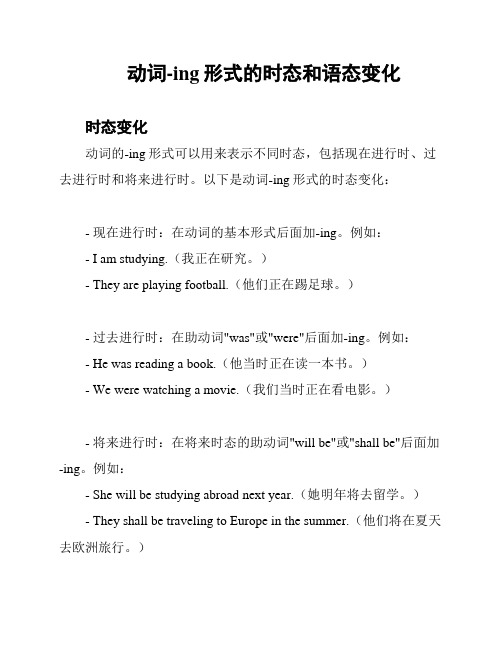
动词-ing形式的时态和语态变化时态变化动词的-ing形式可以用来表示不同时态,包括现在进行时、过去进行时和将来进行时。
以下是动词-ing形式的时态变化:- 现在进行时:在动词的基本形式后面加-ing。
例如:- I am studying.(我正在研究。
)- They are playing football.(他们正在踢足球。
)- 过去进行时:在助动词"was"或"were"后面加-ing。
例如:- He was reading a book.(他当时正在读一本书。
)- We were watching a movie.(我们当时正在看电影。
)- 将来进行时:在将来时态的助动词"will be"或"shall be"后面加-ing。
例如:- She will be studying abroad next year.(她明年将去留学。
)- They shall be traveling to Europe in the summer.(他们将在夏天去欧洲旅行。
)语态变化动词的-ing形式还可以用来表示被动语态。
被动语态的构成是将助动词"be"加在动词的-ing形式之前。
以下是动词-ing形式的语态变化:- 现在进行时的被动语态:将"am/is/are"加在动词的-ing形式之前。
例如:- The car is being repaired.(这辆车正在被修理。
)- The house is being renovated.(这栋房子正在被翻新。
)- 过去进行时的被动语态:将"was/were"加在动词的-ing形式之前。
例如:- The cake was being baked when I arrived.(当我到达时,蛋糕正在被烘焙。
)- The bookshelves were being installed yesterday.(书架昨天正在被安装。
动词的-ing形式
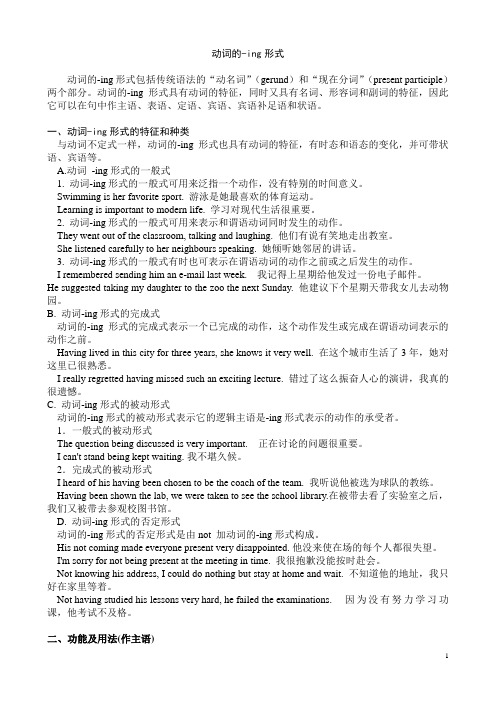
动词的-ing形式动词的-ing形式包括传统语法的“动名词”(gerund)和“现在分词”(present participle)两个部分。
动词的-ing形式具有动词的特征,同时又具有名词、形容词和副词的特征,因此它可以在句中作主语、表语、定语、宾语、宾语补足语和状语。
一、动词-ing形式的特征和种类与动词不定式一样,动词的-ing形式也具有动词的特征,有时态和语态的变化,并可带状语、宾语等。
A.动词-ing形式的一般式1. 动词-ing形式的一般式可用来泛指一个动作,没有特别的时间意义。
Swimming is her favorite sport. 游泳是她最喜欢的体育运动。
Learning is important to modern life. 学习对现代生活很重要。
2. 动词-ing形式的一般式可用来表示和谓语动词同时发生的动作。
They went out of the classroom, talking and laughing. 他们有说有笑地走出教室。
She listened carefully to her neighbours speaking. 她倾听她邻居的讲话。
3. 动词-ing形式的一般式有时也可表示在谓语动词的动作之前或之后发生的动作。
I remembered sending him an e-mail last week. 我记得上星期给他发过一份电子邮件。
He suggested taking my daughter to the zoo the next Sunday. 他建议下个星期天带我女儿去动物园。
B. 动词-ing形式的完成式动词的-ing形式的完成式表示一个已完成的动作,这个动作发生或完成在谓语动词表示的动作之前。
Having lived in this city for three years, she knows it very well. 在这个城市生活了3年,她对这里已很熟悉。
动词加ing的各种形式
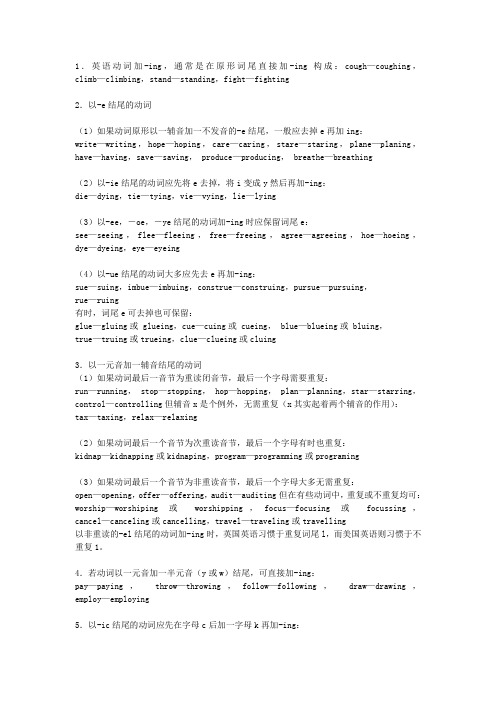
1.英语动词加-ing,通常是在原形词尾直接加-ing构成:cough—coughing,climb—climbing,stand—standing,fight—fighting2.以-e结尾的动词(1)如果动词原形以一辅音加一不发音的-e结尾,一般应去掉e再加ing:write—writing,hope—hoping,care—caring,stare—staring,plane—planing,have—having,save—saving, produce—producing, breathe—breathing(2)以-ie结尾的动词应先将e去掉,将i变成y然后再加-ing:die—dying,tie—tying,vie—vying,lie—lying(3)以-ee,-oe,-ye结尾的动词加-ing时应保留词尾e:see—seeing,flee—fleeing,free—freeing,agree—agreeing,hoe—hoeing,dye—dyeing,eye—eyeing(4)以-ue结尾的动词大多应先去e再加-ing:sue—suing,imbue—imbuing,construe—construing,pursue—pursuing,rue—ruing有时,词尾e可去掉也可保留:glue—gluing或 glueing,cue—cuing或 cueing, blue—blueing或 bluing,true—truing或trueing,clue—clueing或cluing3.以一元音加一辅音结尾的动词(1)如果动词最后一音节为重读闭音节,最后一个字母需要重复:run—running, stop—stopping, hop—hopping, plan—planning,star—starring,control—controlling但辅音x是个例外,无需重复(x其实起着两个辅音的作用):tax—taxing,relax—relaxing(2)如果动词最后一个音节为次重读音节,最后一个字母有时也重复:kidnap—kidnapping或kidnaping,program—programming或programing(3)如果动词最后一个音节为非重读音节,最后一个字母大多无需重复:open—opening,offer—offering,audit—auditing但在有些动词中,重复或不重复均可:worship—worshiping或worshipping,focus—focusing或focussing,cancel—canceling或cancelling,travel—traveling或travelling以非重读的-el结尾的动词加-ing时,英国英语习惯于重复词尾l,而美国英语则习惯于不重复1。
动词的-ing形式
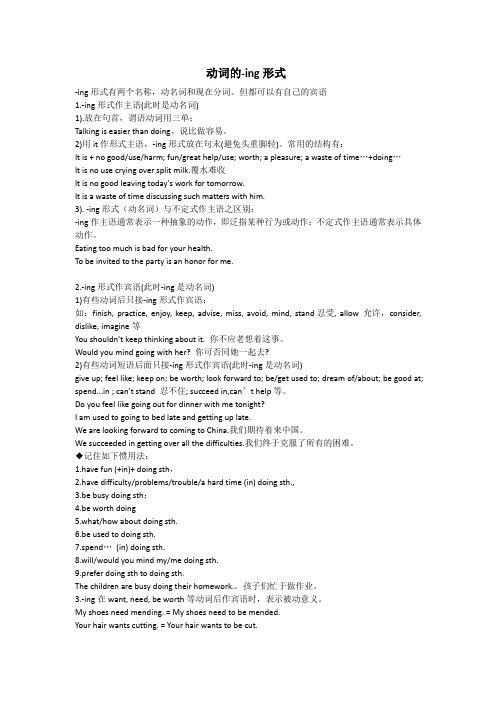
动词的-ing形式-ing形式有两个名称,动名词和现在分词。
但都可以有自己的宾语1.-ing形式作主语(此时是动名词)1).放在句首,谓语动词用三单;Talking is easier than doing。
说比做容易。
2)用it作形式主语,-ing形式放在句末(避免头重脚轻)。
常用的结构有:It is + no good/use/harm; fun/great help/use; worth; a pleasure; a waste of time…+doing…It is no use crying over split milk.覆水难收It is no good leaving today's work for tomorrow.It is a waste of time discussing such matters with him.3). -ing形式(动名词)与不定式作主语之区别:-ing作主语通常表示一种抽象的动作,即泛指某种行为或动作;不定式作主语通常表示具体动作。
Eating too much is bad for your health.To be invited to the party is an honor for me.2.-ing形式作宾语(此时-ing是动名词)1)有些动词后只接-ing形式作宾语;如:finish, practice, enjoy, keep, advise,miss,avoid, mind, stand忍受, allow 允许,consider,dislike, imagine等You shouldn’t keep thinking about it. 你不应老想着这事。
Would you mind going with her? 你可否同她一起去?2)有些动词短语后面只接-ing形式作宾语(此时-ing是动名词)give up; feel like; keep on; be worth; look forward to; be/get used to; dream of/about; be good at; spend...in ; can’t stand 忍不住; succeed in,can’t help等。
动词ing形式的用法及变化规则

动词ing形式的用法及变化规则动词-ing形式包括传统语法的动名词和现在分词两个部分。
动词的-ing形式具有动词的特征,同时又具有名词、形容词和副词的特征,因此它可以在句中作主语、表语、定语、宾语、宾语补足语和状语。
动词现在分词由动词原形在词尾加ing构成,其规则如下:1)一般情况下直接加ingthink---thinking sleep---sleeping study---studying speak---speaking carry---carrying say---saying2)以不发音的字母e结尾的单词,去掉字母e,再加ingwake---waking make---making come---coming take---taking leave---leaving have---having3)以重读闭音节结尾,呈现“辅,元,辅”结构的动词,先双写末尾的辅音字母,再加ing 。
初中学过的这类词有:begin,cut, get, hit, run, set, sit, spit, stop, swim, beg, drop, fit, nod, dig, forget, regret, rid, 等。
visit 不是以重读闭音节结尾,不用双写travel虽然重读第一音节,词尾音节不重读,但是现在分词仍要双写末尾辅音字母,然后再加ing ,如:travel---travelling. 初中阶段此类词只有这一个。
4)以 y 结尾的动词直接加 ingcarry—— carrying enjoy—— enjoying5)以ie结尾的动词,把ie改为y ,再加ingdie---dying lie---lying要特别注意有些动词没有进行时态.1、表示状态、思想、感情和感觉的动词,如:see, hear, love, know, want, hope, think等,没有进行时态。
2、当have/has作为“拥有”时,没有进行时态,但表示“开会,吃饭,玩得高兴”等意思时,可以用进行时表达。
动词-ing

动名词的形式
主动形式
一般式 doing having done
被动形式
being done having been done
完成式
1.动名词一般式doing表示的动作通常是一般性动 作,即不是明确地发生在过去、现在或将来的动 作,或是与谓语动词所表示的动作同时发生的动 作。 例:Students sitting in this classroom are having an English contest.(主动,同时发生) The man planting trees in front of the building is our PE teacher.(主动,进行)
2.有些动词后既可跟 动名词 也可跟 不定式,意义 上没多大区别。如:like, dislike, love, prefer, start, begin, continue 等。 例: I don’t like watching TV.(指一般性行为) I like to play basketball tomorrow. (指一次的动作) 3.need,want,require,deserve+doing/to be done 主动形式表达被动意义。 例:The car needs repairing/to be repaired. 4.permit,allow,advise,forbid doing sth. sb. to do sth. 例:She doesn’t allow talking here. us to talk here.
例:He kept me waiting for an hour in the rain.
六、做状语
可充当时间、原因、条件、伴随、结果或让步 状语。逻辑主语为句子的主语,表主动,或者 进行。 例:When hearing the good news,the students were wild with joy.(时间状语) There being nothing to do, she went home.(原因状语)
动词的-ing形式

第6章动词的-ing形式动词的-ing形式包括传统语法的“动名词”(gerun d)和“现在分词”(prese ntpa rtici ple)两个部分。
动词的-in g形式具有动词的特征,同时又具有名词、形容词和副词的特征,因此它可以在句中作主语、表语、定语、宾语、宾语补足语和状语。
一、动词-i ng形式的特征和种类与动词不定式一样,动词的-ing形式也具有动词的特征,有时态和语态的变化,并可带状语、宾语等。
A.动词-ing形式的一般式1.动词-i ng形式的一般式可用来泛指一个动作,没有特别的时间意义。
Swim mingis he r fav orite spor t. 游泳是她最喜欢的体育运动。
L earni ng is impo rtant to m odern life. 学习对现代生活很重要。
2. 动词-ing形式的一般式可用来表示和谓语动词同时发生的动作。
The y wen t out of t he cl assro om, t alkin g and laug hing.他们有说有笑地走出教室。
Sheliste ned c arefu lly t o her neig hbour s spe aking. 她倾听她邻居的讲话。
3. 动词-ing形式的一般式有时也可表示在谓语动词的动作之前或之后发生的动作。
Iremem bered send ing h im an e-ma il la st we ek. 我记得上星期给他发过一份电子邮件。
H e sug geste d tak ing m y dau ghter to t he zo o the next Sund ay. 他建议下个星期天带我女儿去动物园。
动词的ing形式

动词的-ing形式用法讲解Forgive me for my having been troubling you.原谅我打扰了你。
(2)动词的-ing形式的语态动词的-ing形式有主动和被动两种形式,主动式通常表示它的逻辑主语是其动作的执行者;被动式通常表示逻辑主语是动作的承受者时。
①主动语态Walking in the street yesterday afternoon, he came across Mr. Smith.昨天他在大街上散步时遇到了史密斯先生。
His often coming late made his boss very angry.他经常迟到使他的老板很恼火。
②被动语态动词的-ing形式的被动语态分为一般式和完成式两种。
一般式(being d one)表示一个被动动作正在进行,或与谓语动词的动作同时发生;完成式(having been done)表示一个被动动作发生在谓语动词的动作之前。
He has always insisted on his being called Dr. Turner instead of Mr. Turner.他坚持让人家叫他特纳博士而不是特纳先生。
Do you mind Jam’s being left alone at home? 让詹姆自己在家你介意吗?While shopping, people sometimes can't help being persuaded into buying something theydon't really need.买东西时,人们有时情不自禁的被说服买一些他们确实不需要的东西。
I noticed the boy being beaten by his m other.我注意到那男孩挨他母亲的打。
Having been cheated many times, she now believes in nobody. 由于多次受骗,所以她现在对任何人都不信任。
动词加ing的各种形式

1.英语动词加-ing,通常是在原形词尾直接加-ing构成:cough-coughing,climb—climbing,stand—standing,fight—fighting2.以-e结尾的动词(1)如果动词原形以一辅音加一不发音的-e结尾,一般应去掉e再加ing:write-writing,hope-hoping,care—caring,stare—staring,plane-planing,have-having,save—saving, produce—producing, breathe—breathing(2)以—ie结尾的动词应先将e去掉,将i变成y然后再加—ing:die—dying,tie—tying,vie-vying,lie—lying(3)以-ee,-oe,-ye结尾的动词加-ing时应保留词尾e:see—seeing,flee-fleeing,free—freeing,agree—agreeing,hoe—hoeing,dye—dyeing,eye—eyeing(4)以—ue结尾的动词大多应先去e再加-ing:sue—suing,imbue—imbuing,construe-construing,pursue—pursuing,rue—ruing有时,词尾e可去掉也可保留:glue—gluing或 glueing,cue—cuing或 cueing, blue—blueing或 bluing,true—truing或trueing,clue—clueing或cluing3.以一元音加一辅音结尾的动词(1)如果动词最后一音节为重读闭音节,最后一个字母需要重复:run—running, stop—stopping, hop—hopping, plan—planning,star-starring,control-controlling但辅音x是个例外,无需重复(x其实起着两个辅音的作用):tax-taxing,relax—relaxing(2)如果动词最后一个音节为次重读音节,最后一个字母有时也重复:kidnap—kidnapping或kidnaping,program—programming或programing(3)如果动词最后一个音节为非重读音节,最后一个字母大多无需重复:open-opening,offer-offering,audit—auditing但在有些动词中,重复或不重复均可:worship—worshiping或 worshipping,focus-focusing或 focussing,cancel-canceling 或cancelling,travel—traveling或travelling以非重读的—el结尾的动词加—ing时,英国英语习惯于重复词尾l,而美国英语则习惯于不重复1.4.若动词以一元音加一半元音(y或w)结尾,可直接加-ing:pay—paying, throw—throwing,follow—following, draw-drawing, employ-employing5.以—ic结尾的动词应先在字母c后加一字母k再加—ing:frolic-frolicking,panic—panicking,mimic—mimicking,picnic—picnicking,traffic-trafficking这主要是为在动词后加—ing之后保留/k/这个音。
英语语法-动词的ing形式

第六章动词的-ing形式动词的-ing形式包括传统语法的“动名词”(gerund)和“现在分词”(present participle)两个部分。
动词的-ing形式具有动词的特征,同时又具有名词、形容词和副词的特征,因此它可以在句中作主语、表语、定语、宾语、宾语补足语和状语。
一、动词-ing形式的特征和种类与动词不定式一样,动词的-ing形式也具有动词的特征,有时态和语态的变化,并可带状语、宾语等。
A.动词-ing形式的一般式1. 动词-ing形式的一般式可用来泛指一个动作,没有特别的时间意义。
Swimming is her favorite sport. 游泳是她最喜欢的体育运动。
Learning is important to modern life. 学习对现代生活很重要。
2. 动词-ing形式的一般式可用来表示和谓语动词同时发生的动作。
They went out of the classroom, talking and laughing. 他们有说有笑地走出教室。
She listened carefully to her neighbours speaking. 她倾听她邻居的讲话。
3. 动词-ing形式的一般式有时也可表示在谓语动词的动作之前或之后发生的动作。
I remembered sending him an e-mail last week.我记得上星期给他发过一份电子邮件。
He suggested taking my daughter to the zoo the next Sunday. 他建议下个星期天带我女儿去动物园。
B. 动词-ing形式的完成式动词的-ing形式的完成式表示一个已完成的动作,这个动作发生或完成在谓语动词表示的动作之前。
Having lived in this city for three years, she knows it very well. 在这个城市生活了3年,她对这里已很熟悉。
动词-ing形式

• (1)-ing分词(短语)作主语: Saying is easier than doing. 说比做容易。 • ①-ing分词(短语)作主语时,谓语动词用单数。 Teaching is my full-time job. • ②在下面两种结构中,-ing分词(短语)也作主语: Ⅰ. 为了保持句子平衡,通常用it作形式主语,而把真正主 语-ing放在句末。
• 但有些词后面接动名词或不定式做宾语,表示
不同意义,如:
用法 例句 forget /remember / I forget mailing your letter. regret + V-ing(已做了) 我忘了已将你的信寄出了。 I forget to mail your letter. forget /remember / 我忘了要去给你寄信。 regret + to V (未做) Being early may mean wasting a Mean + V-ing(意味着) little time. 早去也许会浪费一点时间。 You really mean to go? Mean + to V(打算) 你真的想走吗? He tried opening the door with the Try + V-ing(试着在做) key. 他试着用这把钥匙开门。 He tried to open the door with the Try + to V(设法在做) key. 他想要用这把钥匙开门。
类别 形式
及 物
动
词
不及物动词
主 动
被
动
主
动
一般式 doing
being done doing having done
动词-ing形式的用法

动词-ing形式的用法
动词-ing形式是英语中一种非限定性动词形式,通常在句子中作为动词或形容词的补充使用。
下面是动词-ing形式的几种常见用法:
1. 动作的进行
动词-ing形式可以表示动作的进行。
例如:
- I am studying for my exam. (我正在为考试复。
)
- They are playing basketball in the park. (他们在公园里打篮球。
)
2. 表示惯或常态
动词-ing形式还可以表示惯或常态的动作。
例如:
- I enjoy reading books. (我喜欢读书。
)
- She loves dancing. (她喜欢跳舞。
)
3. 作形容词补足语
动词-ing形式也可以作为形容词的补足语,修饰名词。
例如:- The running water is very clean. (流动的水非常干净。
)
- I saw a dancing girl at the party. (我在派对上看到了一个跳舞
的女孩。
)
4. 作状语
动词-ing形式还可以作为状语,对句子的动作进行修饰。
例如:- She left the room, crying. (她边哭边离开了房间。
)
- He typed the document, smiling. (他一边微笑着,一边打字。
)
需要注意的是,动词-ing形式的用法并不是固定的,具体还要
根据句子的语境来确定。
以上是动词-ing形式的一些常见用法,希望对您有帮助。
语法知识——动词的-ing形式

作主语 动词的 -ing形式是动词的⼀种⾮谓语形式,由动词原形加 -ing构成,包括 -ing分词和 -ing动名词。
可以在句⼦中⽤作主语、表语、宾语、宾语补语、状语和定语。
1.⼀般形式 Seeing is believing. 眼见为信。
Coming to Hangzhou by train takes about 16 hours. 乘⽕车到杭州要16个⼩时。
2.通常为了避免句⼦主语过于冗长,⽤it作形式主语。
如: It‘s nice talking with you. 和你谈话很⾼兴。
It‘s no use arguing with him. 跟他争论没⽤。
3.“There + be + no + -ing”结构,此结构的意义相当于“It‘s impossible + 不定式”。
如: There is no harm in doing so. 这样做没有害处。
作表语 动词 -ing可⽤来作表语。
如: This food smells inviting. 这种⾷物⾹味怡⼈。
My favorite sport is swimming. 我最喜欢的运动是游泳。
Their job is cleaning the window. 他们的⼯作是打扫窗⼦。
作宾语 1.动词-ing形式可以⽤作动词、短语动词和介词的宾语。
I warned her against driving fast. Jim dislikes eating chocolate. 2.有些动词和动词短语后接作宾语的⾮限定性动词时只能是-ing分词,常见的这类动词有:admit, acknowledge,advise, appreciate, avoid, delay, deny, dislike, enjoy, excuse, escape, fancy, finish, forgive, face, endure, involve, give up, imagine, mention, mind, miss, pardon, practise, require, resent, resist, suggest, recall, resist, understand等。
动词的-ing形式
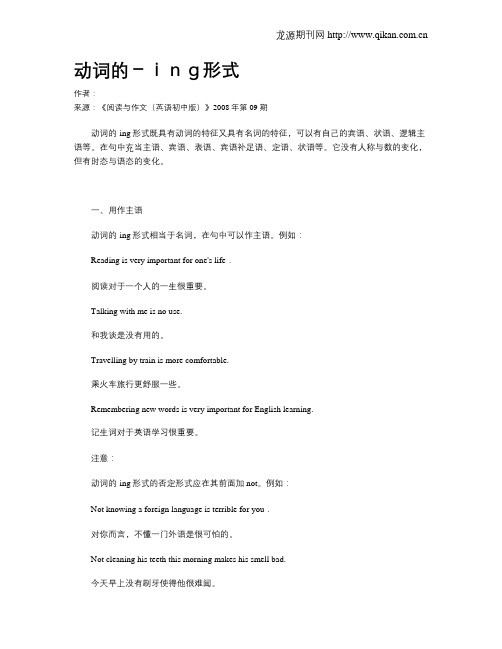
动词的-ing形式作者:来源:《阅读与作文(英语初中版)》2008年第09期动词的-ing形式既具有动词的特征又具有名词的特征,可以有自己的宾语、状语、逻辑主语等。
在句中充当主语、宾语、表语、宾语补足语、定语、状语等。
它没有人称与数的变化,但有时态与语态的变化。
一、用作主语动词的-ing形式相当于名词,在句中可以作主语。
例如:Reading is very important for one's life.阅读对于一个人的一生很重要。
Talking with me is no use.和我谈是没有用的。
Travelling by train is more comfortable.乘火车旅行更舒服一些。
Remembering new words is very important for English learning.记生词对于英语学习很重要。
注意:动词的-ing形式的否定形式应在其前面加not。
例如:Not knowing a foreign language is terrible for you.对你而言,不懂一门外语是很可怕的。
Not cleaning his teeth this morning makes his smell bad.今天早上没有刷牙使得他很难闻。
带有逻辑主语的-ing形式,not应在逻辑主语与-ing形式之间。
例如:His not coming made us worried.他没来使得我们很担心。
Her not waiting for us looks a little surprised.她没等我们显得有点奇怪。
二、用作宾语动词的—ing形式可作介词的宾语、动词的宾语或某些形容词的宾语。
(1)常跟动词的-ing形式作宾语的动词及短语有advise,allow,enjoy,finish,escape,keep,imagine, mind,miss,practise,stop,suggest,give up,keep on, feel 1ike,look forward to,pay attention to,can't help等。
动词ing形式
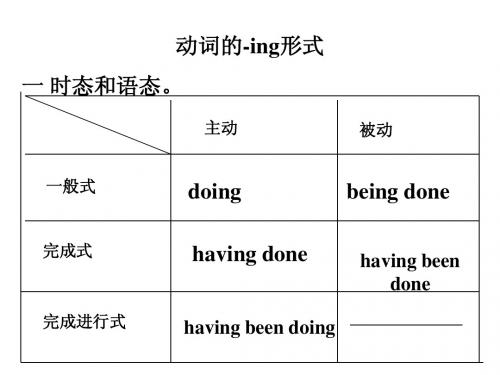
= … to be done
6 6 . be worth +doing (无被动)
(四)作定语.
1. 说明所修饰词的用途,表示“供…之用”。 sleeping car, reading room, walking stick Don’t speak in the reading room.
2.说明所修饰词的性质.表示“…的”意思。单个 词放前,短语放后,相当于定语从句。
It is pleasant working wi主语的内容 , 表语和主语可以互换 位置,相当于不定式. Seeing is believing . My job is teaching.
2. 说明主语的性质或特征.
The film is interesting.
keep on, mind, miss(错过), practise , risk, suggest, give up, can’t help, cannot stand, resist, feel like, put off, include.)
2 .作介词宾语. devote oneself to, the key/entrance/answer to, get down to, pay attention to, Look forward to, see to(注意,处理,照料), be used to, turn to, lead to,
动词的-ing形式
一 时态和语态。
主动 被动
一般式
doing having done
having been doing
being done
having been done
完成式
完成进行式
一般式: I hate smoking。(动作发生在 谓语动作之后或同时)
- 1、下载文档前请自行甄别文档内容的完整性,平台不提供额外的编辑、内容补充、找答案等附加服务。
- 2、"仅部分预览"的文档,不可在线预览部分如存在完整性等问题,可反馈申请退款(可完整预览的文档不适用该条件!)。
- 3、如文档侵犯您的权益,请联系客服反馈,我们会尽快为您处理(人工客服工作时间:9:00-18:30)。
动词的-ing形式动词的ing形式包括现在分词(Present Participle)和动名词(Gerund)。
具有名词、代词、形容词、副词的特征,在句中可作主语、表语、宾语、宾语补足语、主语补足语、定语状语。
动词的-ing形式的时态和语态时态/语态主动语态被动语态一般式doing being done完成式having done having been done否定式在doing前面加not动词的-ing形式的逻辑主语带有逻辑主语的-ing形式称为-ing形式的复合结构。
当-ing形式的逻辑主语与句子主语不一致时,要在-ing形式前加上物主代词或名词所有格,构成-ing形式的复合结构。
其中物主代词(名词所有格)是逻辑上的主语,-ing形式是逻辑上的谓语。
-ing形式的复合结构在句中可作主语、宾语、表语、状语等,分别相当于一个主语从句、宾语从句、表语从句、状语从句。
Her coming to help encouraged all of us. (= That she came to help encouraged all of us.)她来帮忙鼓舞了我们。
Jane’s being careless caused so much trouble. (= That Jane was careless caused so much trouble.) 简这么粗心惹了不少麻烦。
What’s troubling us is their not doing away with so many cigarette ads. (What’s troubling us is that they have not done away with so many cigarette ads.)令我们烦恼的是他们没有消除过多的香烟广告。
在口语中,如果-ing形式作宾语,其中的物主代词常用人称代词的宾格,名词所有格常用名词普通格来代替,但在句首作主语则不行。
Would you mind my/me using your telescope? 你介意我用一下你的望远镜吗?The father insisted on his son’s/his son going to college. 父亲坚决要求儿子上大学。
Mary’s (不可用Mary) being ill made her mother upset. 玛丽病了,这使她妈妈很着急。
Your (不可用You) going there will help a lot. 你去那将会有很大帮助。
注:下列情况-ing形式的逻辑主语必须用名词普通格或人称代词宾格。
①无生命名词The baby was made awake by the door suddenly shutting. 婴儿被猛烈的关门声吵醒。
②有生命名词但表示泛指意义Have you ever heard of women practising boxing? 你听说过妇女练拳击吗?③两个及以上有生命名词并列Do you remember your parents and me talking about this?你记得你父母和我谈论过这事吗?动词的-ing形式的语法功能:在句中作主语、宾语、表语、宾语补足语、主语补足语、定语、状语等。
①作主语:表示一种概念、习惯或经验。
常用it作形式主语,把-ing形式置于句尾,常用于固定句型。
Reading is an art. 读书是一种艺术。
Working in this conditions is not a pleasure but a suffer.在这种条件下工作不是一种乐趣而是一种痛苦It is no good/use crying over spilt milk. 作无益的后悔是无用的。
It is a waste of time persuading such a person to join us.劝说这样的人加入我们真是浪费时间。
②作宾语:A 作动词的宾语,某些动词后只能用动词的-ing形式作宾语。
He tried to avoid answering my question. 他试图避而不答我的问题。
I s uggest leaving now. 我建议现在就离开。
常用后接动词的-ing形式作宾语的动词有:admit 承认advise 建议allow 允许avoid 避免can’t help 禁不住can’t stand 忍不住consider 考虑delay 推迟enjoy 喜欢finish 完成give up 放弃imagine 想象include 包括keep 保持mind 介意miss 错过put off 推迟practise 练习resist 抵抗keep on 继续B作介词的宾语,和固定搭配相关。
We are thinking of making a new plan for the next term.我们正考虑为下学期制定新计划。
Shall we have a rest or get down to doing our work? 我们休息呢还是开始干活?We should prevent the river from being polluted. 我们应阻止河流被污染。
固定的“动+介”搭配:admit to承认be/get/become used to习惯于be equal to等于,胜任devote to致力于depend on依靠get down to着手insist on坚持look forward to期待object to反对stick to坚持take to开始see to注意、处理set about着手lead to导致pay attention to注意think about考虑succeed in成功worry about担心另还有“名+介”“形+介”结构Our chemistry teacher has a strange way of making his class lively and interesting.我们的化学老师有一种能使课堂生动有趣的奇特方法。
There is still hope of achieving more success though you are faced with lots of difficulties.尽管你面临很多困难但仍有希望获得成功。
I’m tired of having the same food every day. 我厌倦了天天吃同样的东西。
Peter is angry about not being invited to the party. 没有被邀请参加聚会,彼得很生气。
③作宾语补足语A 动词的-ing形式可以在see,hear,notice,watch,feel,smell,look at,listen to,observe,find等表示感官和心理状态的动词后面作宾补,和宾语一起构成复合宾语。
When I was young, I preferred to watch trains pulling in and out.我小时候喜欢看火车进站和出站的情景。
I suddenly felt myself being hit by a heavy fist. 我突然感到被重重地打了一拳。
B 动词的-ing 形式也可以在have,get,leave,keep,send等动词后作宾语补足语。
The man left us standing alone, unable to find any help.那个人让我们单独站在那儿,无法找到任何帮助。
Don’t have your children working hard at their homework all the time.不要让你的孩子一直不停地做作业。
Parents should learn to keep their children most often using their mind.父母应经常让自己的孩子开动脑筋。
④作表语A -ing形式作表语时,句子主语常是无生命名词或what引导的名词性从句。
表语-ing 形式与主语通常是对等关系,表示主语的内容。
主语、表语可互换位置。
Your task is cleaning the windows.(=Cleaning the window is your task.)你的任务就是擦窗户。
What I hate most is being laughed at.(=Being laughed at is what I hate most.)我最痛恨的就是被别人嘲笑。
B 表示主语的某种性质或状态What you said is really inspiring.你所说的真令人鼓舞。
The speech you delivered is very interesting and encouraging.你的演讲很有趣且很鼓舞人。
⑤作定语动词的-ing形式作定语一般有两种含义,有的前置,有的后置。
A 表示被修饰词的某种用途,此时多前置。
a walking stick(=a stick for walking=a stick which is used for walking) 拐杖a washing machine(=a machine for washing=a machine which is used for washing)洗衣机a reading room(a room for reading=a room which is used for reading) 阅览室sleeping pills(=pills for sleeping=pills which are used for sleeping) 安眠药常用必备:a bathing cap浴帽 a changing room更衣室a waiting room等候室 a watering can喷壶a guessing game猜字游戏 a collecting tin募捐盒an ironing board烫衣板 a hiding place藏身处a racing car赛车an operating table手术台building materials建筑材料 a diving board跳板a writing table写字台reading materials阅读材料closing speech闭幕词opening speech开幕词working hours工作时间 a dancing hall舞厅B表示所修饰的人或物的动作或状态,在意思上接近一个定语从句,可以表示正在进行的动作,也可以表示经常性的动作或当时的状态。
